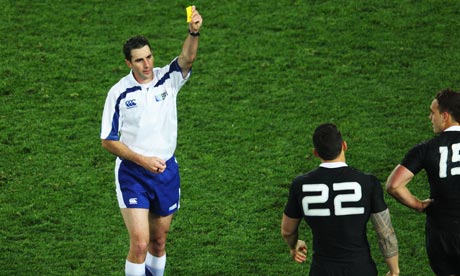What Have Rules and Referees Done to William Webb Ellis' Game?
Chronicles from New Zealand, the column compiled by our friend from Wellington, AzzurriNZ, covering the World Cup and a tradition called rugby from a down-under point of view.
Test rugby used to be a simple game, where 15 grown men would smack the bejeebers out of each other and then, when they had run out of energy, they would focus on the ball and try to score tries.
The history of the game is littered with a trove of cherished off-the-ball incidents. Stuff the referees probably knew was happening but were seemingly happy to ignore as the boys sorted themselves out. The referees adopted a laissez-faire attitude, for their role was not to dominate proceedings.
At some point, someone in the corridors of power made a decision that this was not good enough—that the players needed to obey the regulations of the game. That authority on the field rested with the referees. After all, they were the sport's on-field agent who had a responsibility to ensure that no one team would gain an unfair advantage by cheating.
Throughout the World Cup, many fans have naively expressed a hope that games would not be determined by the referees—an expectation that no one has been able to manage. The reason the referees dominate proceedings is that players do not abide to the letters of the law. It seems that even today's modern players prefer to cling to their ancestral right of being able to sort things out themselves.
The IRB (the sport's governing body) is adamant they want a certain type of game and thus stringently persist with the rules they have manufactured. For the game of rugby to progress, these conflicts of interests need to be managed. With the dawning of professionalism, rugby attempted to move on from a game that involved neanderthals anarchically banging into each other. Rugby players were now paid, and the sport had to put in measures to protect its No. 1 assets—the stars that roamed the field.
The rules that exist today have been set up with good intentions. The IRB's rulebook states the objective of the laws are to enable "contest and continuity." The IRB are keen to produce a sport that is fantastic to watch. A great product that will increase the reach of their game and its revenue-generating potential. The laws have also been devised to protect that which makes the game unique as a sport—rucks, mauls, line-outs and scrums.
Rugby has 21 laws. This may sound manageable, but within these laws sit a body of regulations, sub-articles and bullets of clarification. The laws come together like a bowl of vermicelli, layers of delicate noodles intricately immersed together and impossible to unravel in a split-second judgement.
As the World Cup has unfolded, it's become apparent that these rules have been produced with scant regard to player intention or motivation. They've also been designed with apparent disregard for how easy the rules are to officiate. Especially with the system of one referee, two sideline assistant referees and television match officials to confirm "if there is any reason I can not award that try."
The reality of rugby is that it's all about one man's interpretation of the rules as he watches the game unfold only metres away from where he stands. That man is the referee, and he controls proceedings. The other reality is that the nature of the rules makes it difficult and the intensity of pressure makes it nigh impossible to give a faultless performance as a test rugby referee.
What normally happens at the breakdown is a mass of bodies come together—the union of bodies act as a barrier shielding the ball from visibility. No one, besides the parties entertained in the milieu of sinew, really knows what's happening with the ball. This is where the real breakdown in our sport is occurring. The breakdown between the reality of the game and the principles and objectives of the game's rules.
In these situations—be it a ruck or maul—what the player wants is the ball. The rules today act like a process that players must litigiously follow before they can compete for a ball. It's almost like they need regulatory consent to pick up the ball and run with it. What the sport needs is simple rules that allow players to compete for the ball. A set of rules that allows teams flexibility to apply and showcase their skills. What the fans want is to see is movement of the ball.
The IRB wanted the breakdown monitored to ensure a quick ball that would enable good open-running rugby. Unfortunately, history shows that bureaucracies and the rules they pursue can create unproductive sub-industries—in rugby's case, the rules have seen the development of manipulative loose forward play (instead of the desired creative attacking prowess).
For example, with the Wallabies—a team that has traditionally been known for its enterprising back line play—at the start of the tournament, everyone was talking about Genia, Cooper and Ioane. Most attention has now been diverted to their open side flanker David Pocock. In their quarterfinal win over South Africa, Australian centre Adam Ashley-Cooper first touched the ball in the 78th minute. The first opportunity he got to run with the ball was with two minutes left on the clock. What the referees want is a set of rules they can realistically police and enforce.

Referees, like all other human beings, want to do a good job. They want kudos and recognition like they rest of us. It is highly doubtful that any referee has entered any game in this tournament with a corrupted agenda. Where they have failed is in being able to achieve the impossible. The impossible is consistently applying all the rules that make up the game, managing players misconduct, without exerting a dominant presence on the park.
Too many rules exist that deny players of their basic desire to have and hold the ball. Too many rules require players to assume impossible body positions; demands which become less likely as the game progresses and fatigue sets in. Too many rules call for the referees to adjudicate on things they can not observe. The final irony sits with the man who inspired this article, Welsh captain Sam Warburton.
An open side flanker, who up until his game against France was sitting in the box seat for the best and fairest player award (if such an accolade exists) at this tournament. Only days before the World Cup started, Warburton was asked to comment on All Black flanker Richie McCaw and accusations around his cheating. Warburton's response was "I could play 80 minutes and pick out 10 things where someone has done something illegal, but it goes on all the time constantly. I think its something all the players, from 1 to 15 try and do on the pitch at some stage."
Where other teams are throwing accusations of cheating at each other, its refreshing to see Warburton stand apart from the crowd and be honest about a reality that the game does not seem interested in. By implication, players cheat because they're breaking the rules. If there exists less rules that can be realistically policed, then it becomes harder to cheat.
So back to that famed moment when William Webb-Ellis picked up the ball. What if he had of been lying on the ground when he played the ball? Or if he had not come in through the gate? Or if a ruck had already been formed? In the confusion and in his frustration, maybe Willie might of put the ball back on the ground and continued playing football.
@AzzurriNZ
Test rugby used to be a simple game, where 15 grown men would smack the bejeebers out of each other and then, when they had run out of energy, they would focus on the ball and try to score tries.
The history of the game is littered with a trove of cherished off-the-ball incidents. Stuff the referees probably knew was happening but were seemingly happy to ignore as the boys sorted themselves out. The referees adopted a laissez-faire attitude, for their role was not to dominate proceedings.
At some point, someone in the corridors of power made a decision that this was not good enough—that the players needed to obey the regulations of the game. That authority on the field rested with the referees. After all, they were the sport's on-field agent who had a responsibility to ensure that no one team would gain an unfair advantage by cheating.
Throughout the World Cup, many fans have naively expressed a hope that games would not be determined by the referees—an expectation that no one has been able to manage. The reason the referees dominate proceedings is that players do not abide to the letters of the law. It seems that even today's modern players prefer to cling to their ancestral right of being able to sort things out themselves.
The IRB (the sport's governing body) is adamant they want a certain type of game and thus stringently persist with the rules they have manufactured. For the game of rugby to progress, these conflicts of interests need to be managed. With the dawning of professionalism, rugby attempted to move on from a game that involved neanderthals anarchically banging into each other. Rugby players were now paid, and the sport had to put in measures to protect its No. 1 assets—the stars that roamed the field.
The rules that exist today have been set up with good intentions. The IRB's rulebook states the objective of the laws are to enable "contest and continuity." The IRB are keen to produce a sport that is fantastic to watch. A great product that will increase the reach of their game and its revenue-generating potential. The laws have also been devised to protect that which makes the game unique as a sport—rucks, mauls, line-outs and scrums.
Rugby has 21 laws. This may sound manageable, but within these laws sit a body of regulations, sub-articles and bullets of clarification. The laws come together like a bowl of vermicelli, layers of delicate noodles intricately immersed together and impossible to unravel in a split-second judgement.
As the World Cup has unfolded, it's become apparent that these rules have been produced with scant regard to player intention or motivation. They've also been designed with apparent disregard for how easy the rules are to officiate. Especially with the system of one referee, two sideline assistant referees and television match officials to confirm "if there is any reason I can not award that try."
The reality of rugby is that it's all about one man's interpretation of the rules as he watches the game unfold only metres away from where he stands. That man is the referee, and he controls proceedings. The other reality is that the nature of the rules makes it difficult and the intensity of pressure makes it nigh impossible to give a faultless performance as a test rugby referee.
What normally happens at the breakdown is a mass of bodies come together—the union of bodies act as a barrier shielding the ball from visibility. No one, besides the parties entertained in the milieu of sinew, really knows what's happening with the ball. This is where the real breakdown in our sport is occurring. The breakdown between the reality of the game and the principles and objectives of the game's rules.
In these situations—be it a ruck or maul—what the player wants is the ball. The rules today act like a process that players must litigiously follow before they can compete for a ball. It's almost like they need regulatory consent to pick up the ball and run with it. What the sport needs is simple rules that allow players to compete for the ball. A set of rules that allows teams flexibility to apply and showcase their skills. What the fans want is to see is movement of the ball.
The IRB wanted the breakdown monitored to ensure a quick ball that would enable good open-running rugby. Unfortunately, history shows that bureaucracies and the rules they pursue can create unproductive sub-industries—in rugby's case, the rules have seen the development of manipulative loose forward play (instead of the desired creative attacking prowess).
For example, with the Wallabies—a team that has traditionally been known for its enterprising back line play—at the start of the tournament, everyone was talking about Genia, Cooper and Ioane. Most attention has now been diverted to their open side flanker David Pocock. In their quarterfinal win over South Africa, Australian centre Adam Ashley-Cooper first touched the ball in the 78th minute. The first opportunity he got to run with the ball was with two minutes left on the clock. What the referees want is a set of rules they can realistically police and enforce.

Referees, like all other human beings, want to do a good job. They want kudos and recognition like they rest of us. It is highly doubtful that any referee has entered any game in this tournament with a corrupted agenda. Where they have failed is in being able to achieve the impossible. The impossible is consistently applying all the rules that make up the game, managing players misconduct, without exerting a dominant presence on the park.
Too many rules exist that deny players of their basic desire to have and hold the ball. Too many rules require players to assume impossible body positions; demands which become less likely as the game progresses and fatigue sets in. Too many rules call for the referees to adjudicate on things they can not observe. The final irony sits with the man who inspired this article, Welsh captain Sam Warburton.
An open side flanker, who up until his game against France was sitting in the box seat for the best and fairest player award (if such an accolade exists) at this tournament. Only days before the World Cup started, Warburton was asked to comment on All Black flanker Richie McCaw and accusations around his cheating. Warburton's response was "I could play 80 minutes and pick out 10 things where someone has done something illegal, but it goes on all the time constantly. I think its something all the players, from 1 to 15 try and do on the pitch at some stage."
Where other teams are throwing accusations of cheating at each other, its refreshing to see Warburton stand apart from the crowd and be honest about a reality that the game does not seem interested in. By implication, players cheat because they're breaking the rules. If there exists less rules that can be realistically policed, then it becomes harder to cheat.
So back to that famed moment when William Webb-Ellis picked up the ball. What if he had of been lying on the ground when he played the ball? Or if he had not come in through the gate? Or if a ruck had already been formed? In the confusion and in his frustration, maybe Willie might of put the ball back on the ground and continued playing football.
@AzzurriNZ













 IRB.com News
IRB.com News


 England
England Australia
Australia Nuova Zelanda
Nuova Zelanda Francia
Francia Sud Africa
Sud Africa Galles
Galles Argentina
Argentina Irlanda
Irlanda Italia
Italia Scozia
Scozia



4 commenti:
This post is very interesting indeed.
It shows a perfect sample of the Austral attitude toward the game. Thanks to AzurriNz.
The vast majority of Boreals rugby addicts share with South-Africans a pretty different mindset.
Down Under the value of the game to be preserved sound like "KISS" - keep it simple stupid.
Up Here on the contrary, we accepted long time ago that playing rugby UNION (not League) got complicated and decided long ago to DELEGATE TO THE REFEREE THE POWER TO COMMAND, NOT ONLY CONTROL, THE GAME.
It is not(more) a matter of honesty and willingness of the single players, and it ain't a difference between Pros and Amateurs from that standpoint.
Rugby it's easy 'till the game flows without too much breakdowns and scrums, when it's just runs, kicking game and offloads.
Referee's ability and experience enters into the equation when number of scrums and breakdowns elevate. He MUST have the experience to rule them, expecially at a RWC level.
It is not impossible to rule properly scrums and brakdowns: rugby is not rocket science, 90% of the times it is just a matter of experience.
Craig Joubert on one hand showed his experience in ruling properly the Aus-NZl semi final.
On the contrary, Bryce Lawrence performed horribly in the quarter final Sfa-Aus, with his "loose" approach.
Do not get me wrong, I do not mean Lawrence do it on purpose, in order to remove South Africa from All Blacks' route to the final.
I think it was just a byproduct of a "KISS" mentality, of a lesser experience in managing "tighter" games as we are accustomed here in Europe.
That's why, very sorry, Boreal and South African referees do it better, on average. ;)
Sssh, don't say around we're having a conversation on referees and rugby rules ;)
I'm eager to see how Argentinian refs would handle an international game. Most of all, given the traditional strenghts and weaknesses that Argentina displays, would they COMMAND the game or just CONTROL it?
Will any of them be in the refrees panel of the next 4Nations? I guess they'll have to begin as TMOs and sideline assistants, right?
I definitely guess so, as Italians did.
We're starting to referee Celtic League games (Penné) since end of last season, I think. No Italians refs in SixNations yet.
De'Santis did very well as a tmo.
Posta un commento